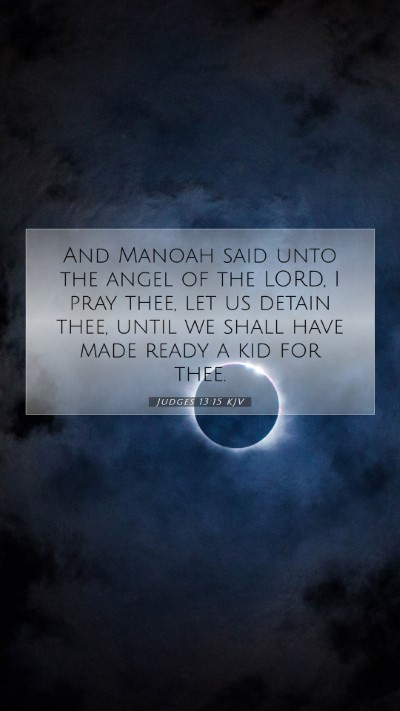Bible Verse Meaning and Commentary: Judges 13:15
Judges 13:15 states, “And Manoah said unto the angel of the LORD, I pray thee, let us detain thee until we shall have made ready a kid for thee.” This passage is rich in meaning and reveals important aspects regarding hospitality, reverence, and divine encounters.
Summary of Judges 13:15
In this verse, Manoah, the father of Samson, interacts with the angel of the Lord. His request to prepare a kid (young goat) signifies his desire to honor this divine visitor with hospitality. This act illustrates the cultural importance of hospitality in ancient Israel, where providing for a guest was considered a sacred duty.
Insights from Biblical Commentaries
-
Matthew Henry:
Matthew Henry emphasizes the significance of Manoah's request. He points out that Manoah's desire to "detain" the angel reflects his desire for a deeper engagement and understanding of this divine encounter. Henry notes the importance of recognizing God's presence and seeking to learn from it.
-
Albert Barnes:
Albert Barnes elaborates on the act of preparing a meal for the angel. He interprets this gesture as a demonstration of respect and the human tendency to seek communion with the divine. Barnes also highlights how Manoah's actions contrast with the nature of the angel, who does not consume earthly food but instead embodies a heavenly presence.
-
Adam Clarke:
Adam Clarke notes the underlying faith of Manoah in inviting the angel to stay. He argues that this willingness to engage demonstrates Manoah's recognition of a divine visitation. Clarke also explains that the term "kid" used here is significant in terms of the sacrificial and communal aspects of the meal, which symbolizes a longing for fellowship with God.
Understanding the Significance
The request made by Manoah can teach us several lessons:
-
Hospitality:
In various cultures, including the Hebrew culture, hospitality is a virtue of great significance. Manoah's desire to host the angel shows the deep respect that was taught in Scripture.
-
Divine Reverence:
This verse highlights the reverence one should have for divine beings. Manoah's actions illustrate the appropriate reverence towards God’s messengers.
-
Seeking Understanding:
Manoah's desire to “detain” the angel reflects a heart that longs for understanding, which is vital in our spiritual journeys. The act shows a proactive approach to learning about God’s will.
Application of Judges 13:15
When applying this verse to daily life, we can consider:
-
Encouraging Hospitality:
We are encouraged to extend hospitality not just to friends and family but also to strangers, reflecting the love of Christ.
-
Approaching God with Respect:
This verse reminds us to approach God with the honor and reverence He deserves. We can learn to respect spiritual moments and encounters in our own lives.
-
Longing for Divine Interaction:
Manoah's engagement with the angel emphasizes the importance of seeking a deeper relationship with God. We should cultivate a desire for interaction with the divine through prayer, study, and worship.
Cross References
- Genesis 18:2 - Abraham's hospitality to the three visitors.
- 1 Samuel 9:22 - Samuel's hospitality to Saul.
- Hebrews 13:2 - Encouragement to show hospitality to strangers.
- Matthew 25:35 - Jesus teaches about hospitality and serving others.
- Malachi 1:6 - A call to honor God and His messengers.
Conclusion
Judges 13:15 serves as an important reminder of the value of hospitality, the importance of reverence towards divine encounters, and the necessity for believers to seek deeper understanding in their relationship with God. Through this examination, one can attain insights into the broader biblical truths surrounding hospitality, reverence, and personal engagement with the divine. Such study can enhance Bible study resources and deepen the understanding of Scripture within study groups and individual study endeavors.


